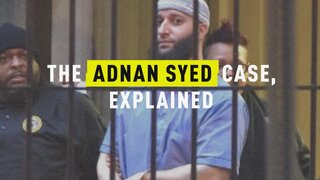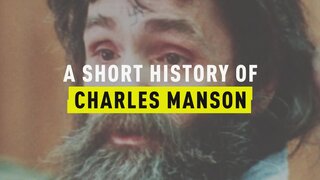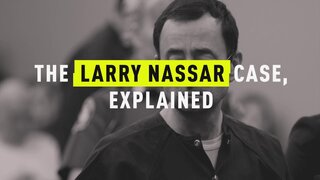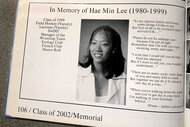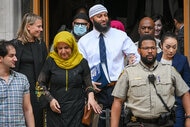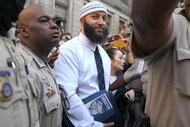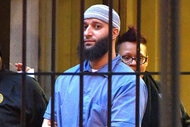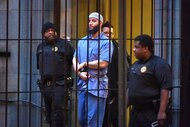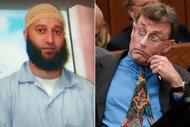Create a free profile to get unlimited access to exclusive videos, breaking news, sweepstakes, and more!
How Did Rabia Chaudry Keep Adnan Syed's Case Alive?
Rabia Chaudry is the reason Adnan Syed's case became the phenomenon that is "Serial."
The first season of "Serial" was downloaded by millions of listeners, all captivated by the story of Adnan Syed, a man who may have been wrongfully convicted of the murder of his high school ex-girlfriend, Hae Min Lee. But while "Serial" host Sarah Koenig and her team get credited for bringing the case to international attention, in truth the catalyst behind the series was Rabia Chaudry, an attorney, family friend of Syed, and his fierce advocate, who is also seen in HBO's new docu-series "The Case Against Adnan Syed."
As Koenig detailed in the first episode, Chaudry was the one who brought the case to her, asking for her help. Of course, Chaudry wasn't expecting the massive outpouring of attention that what would soon follow: She was merely hunting for justice on Syed's behalf.
In the years between Syed's conviction and connecting with Koening, Chaudry had been fighting for Syed. "Before that it was just a matter of getting to the court, finding the best lawyers, coming up with the best legal strategy, and praying that he got justice in court," Chaudry told Oxygen.com.
But Chaudry soon realized that day may not happen with the way things were going. "What I heard at the hearing, the first PCR hearing, I sat there and realized, it’s happening again. He’s not going to win. That’s when I was physically like, f--k the system. I want a journalist... and at that time his lawyer, he was kind of like, ‘I’m gonna walk away from the case, I’ve done what I can do, there’s nothing else I can do.’ Well, I was like, ‘We’re going to do this media thing and trust me on this," she said.
From there, Chaudry found Sarah Koenig, formerly of the Baltimore Sun, and then a producer on "This American Life." Chaudry was "hoping for an investigation."
"I didn’t know it would be ‘Serial.’ [Sarah] didn’t know it would be ‘Serial.’ What I had hoped is that she would find evidence, new evidence that would get us back into court. I had no interest or idea that this could be this huge pop culture phenomenon and it would get so much attention. I didn’t know that, what ‘This American Life’ episode does that? That’s what I thought it was going to be. I thought it was going to be one ‘This American Life’ episode, I didn’t care about the end product. I just cared about the investigation and thought she might make a break, get somebody to talk, find new evidence, something that was overlooked, which journalists can sometimes do very well. That was my hope, that was the hope," Chaudry explained.
And while "Serial" didn't uncover the smoking gun Chaudry was looking, she wasn't deterred. "At the end of the day, 'Serial' was a way for us to move forward in court... to me, the important thing it did is get us what we needed and it did. We got his conviction overturned twice."
Since "Serial," debuted, there's been new momentum behind Syed's case. His conviction has indeed been overturned twice — in 2016, a Baltimore judge vacated his conviction and ordered a new trial. The state appealed, the Maryland Court of Special Appeals sided with the Baltimore judge, the state appealed yet again, and the Maryland Court of Appeals just weighed in. It has decided to reinstate his conviction, reports The Baltimore Sun. Syed's team isn't giving up yet, though: His lawyer Justin Brown told The Baltimore Sun there are at least three other areas of relief they could take.
Chaudry will certainly continue to fight for Syed as well. After the Maryland Court of Appeals' ruling, she tweeted, "I have been processing, through tears and rage, the news since I heard it this afternoon. I am grief stricken but not hopeless. If you think we will give up, you are not paying attention." In a follow-up tweet addressed to the state of Maryland, she continued, "None of us are walking away until you free Adnan."
In the years since "Serial" launched, Chaudry has written a book about the case and the details the podcast left out titled "Adnan's Story: The Search For Truth And Justice After Serial," which includes a foreword from Syed himself. She co-produces and co-hosts a podcast called "Undisclosed," which also delves into the details of Syed's case as well as examining cases of other wrongfully convicted people.
She also in an executive producer for "The Case Against Adnan Syed," a docu-series she told Oxygen.com she was pleased with. "This documentary is different [than 'Serial']. Amy Berg proved her investigative chops when she did 'West of Memphis' and so when she was tapped to direct it, I was like, I know she’s not going to just document this story. She’s going to investigate, and that’s exactly what she did and it met my expectations. Adnan might never get a real trial. In a way, this is the trial. This a challenge to every bit of the state’s evidence and narrative.”
But Chaudry has made it clear she isn't just fighting for Syed, but for Hae Min Lee as well. As she says in the docu-series, "Justice for Adnan is justice for Hae."
“It’s not a thing to say that advocating for him is somehow contradictory to advocating for her. People have these things set up in their mind, but this dichotomy doesn’t exist. When you have a wrongful conviction, the advocacy for the wrongfully convicted is advocacy for the victim," she told Oxygen.com.
